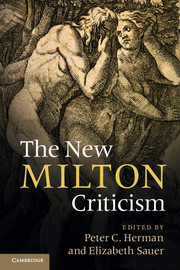Book contents
- Frontmatter
- Contents
- Notes on contributors
- Acknowledgments
- Note on editions
- Introduction Paradigms lost, paradigms found: the New Milton Criticism
- Part I Theodicies
- Part II Critical receptions
- Chapter 7 Against fescues and ferulas: personal affront and the path to individual liberty in Milton’s early prose
- Chapter 8 Disruptive partners: Milton and seventeenth-century women writers
- Chapter 9 Eve and the ironic theodicy of the New Milton Criticism
- Chapter 10 Man and thinker: Denis Saurat, and the old new Milton criticism
- Chapter 11 The poverty of context: Cambridge School History and the New Milton Criticism
- Chapter 12 Afterword
- Index
- References
Chapter 10 - Man and thinker: Denis Saurat, and the old new Milton criticism
Published online by Cambridge University Press: 05 June 2012
- Frontmatter
- Contents
- Notes on contributors
- Acknowledgments
- Note on editions
- Introduction Paradigms lost, paradigms found: the New Milton Criticism
- Part I Theodicies
- Part II Critical receptions
- Chapter 7 Against fescues and ferulas: personal affront and the path to individual liberty in Milton’s early prose
- Chapter 8 Disruptive partners: Milton and seventeenth-century women writers
- Chapter 9 Eve and the ironic theodicy of the New Milton Criticism
- Chapter 10 Man and thinker: Denis Saurat, and the old new Milton criticism
- Chapter 11 The poverty of context: Cambridge School History and the New Milton Criticism
- Chapter 12 Afterword
- Index
- References
Summary
Counting among its participants some of the central figures in English letters, including T. S. Eliot, F. R. Leavis, C. S. Lewis, and William Empson, the lively mid-twentieth-century dispute known as the Milton Controversy represents a fascinating chapter in the emergence of the discipline of academic literary criticism. My intention here is not to rehearse that dispute in any great detail. My primary subject is a book that preceded the Milton Controversy, which began in earnest with the publication of Leavis’s 1933 essay, “Milton’s Verse.” I argue that Denis Saurat’s 1925 landmark study, Milton: Man and Thinker, was the underlying trigger for the Milton Controversy in the wake of which it has been largely consigned to its role as an aberrant curiosity. For the last fifty years, Saurat’s work has been remembered – if it is remembered at all – for its claims concerning Milton’s debt to Jewish mysticism. In an effort to correct this widespread misapprehension, I shall argue that Saurat’s book played a central role in the formulation of many of the key features of the academic study of Milton’s writings, prompting the development of an old new Milton criticism long before its insights, albeit not identified with Saurat, began to receive renewed attention in the New Milton Criticism the present volume seeks to delineate. In my recovery of this critical genealogy, one that restores Saurat and many of his early readers – William Empson being perhaps the most prominent among them – to their proper places in the history of Milton studies, I shall also have occasion to reconsider what has become something of a truism in accounts of trends in Milton studies, that is, the apparent absence of any explicit influence or imprint of what generically gets called “theory.” Critical theory, in all its diverse and often conflicting avatars, has come to represent the destabilizing of literary signification; similarly, Saurat’s work anticipates the New Milton Criticism’s arguments with interpretive orthodoxies. Yet Saurat is also largely responsible for the stubborn, and seemingly un-theoretical, presence of the author Milton – Man and Thinker – in virtually all efforts to render his writings meaningful, whether they be neo-Christian or heterodoxical. By making Saurat’s influence more visible, I will suggest how we might better understand the characteristically idiosyncratic presence – and erasure – of theoretical approaches to the reading of Milton’s writings.
- Type
- Chapter
- Information
- The New Milton Criticism , pp. 194 - 211Publisher: Cambridge University PressPrint publication year: 2012
References
- 2
- Cited by



